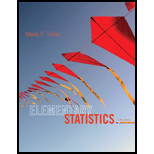
Concept explainers
Identical and Fraternal Twins. In Exercises 25-28, use the data in the following table. Instead of summarizing observed results, the entries reflect the actual probabilities based on births of twins (based on data from the Northern California Twin Registry and the article “Bayesians, Frequeatists, and Scientists” by Bradley Efron, Journal of the American Statistical Association, Vol. 100, No. 469). Identical twins come from a single egg that splits into two embryos, and fraternal twins are from separate fertilized eggs. The table entries reflect the principle that among sets of twins, 1/3 are identical and 2/3 are fraternal Also, identical twins must be of tire same sex and the sexes are equally likely (approximately), and sexes of fraternal twins are equally likely.
Sexes of Twins
| boy/boy | boy/girl | girl/boy | girl/girl | |
| Identical Twins | 5 | 0 | 0 | 5 |
| Fraternal Twins | 5 | 5 | 5 | 5 |
26. Idontical Twins
- a. After having a sonogram, a pregnant woman learns that she will have twins. What is the
probability that she will have identical twins? - b. After studying the sonogram more closely, the physician tells the pregnant woman that she will give birth to twin boys. What is the probability that she will have identical twins? That is find the probability of identical twins given that the wins consist of two boys.
Want to see the full answer?
Check out a sample textbook solution
Chapter 4 Solutions
Elementary Statistics
- Should you be confident in applying your regression equation to estimate the heart rate of a python at 35°C? Why or why not?arrow_forwardGiven your fitted regression line, what would be the residual for snake #5 (10 C)?arrow_forwardCalculate the 95% confidence interval around your estimate of r using Fisher’s z-transformation. In your final answer, make sure to back-transform to the original units.arrow_forward
- BUSINESS DISCUSSarrow_forwardA researcher wishes to estimate, with 90% confidence, the population proportion of adults who support labeling legislation for genetically modified organisms (GMOs). Her estimate must be accurate within 4% of the true proportion. (a) No preliminary estimate is available. Find the minimum sample size needed. (b) Find the minimum sample size needed, using a prior study that found that 65% of the respondents said they support labeling legislation for GMOs. (c) Compare the results from parts (a) and (b). ... (a) What is the minimum sample size needed assuming that no prior information is available? n = (Round up to the nearest whole number as needed.)arrow_forwardThe table available below shows the costs per mile (in cents) for a sample of automobiles. At a = 0.05, can you conclude that at least one mean cost per mile is different from the others? Click on the icon to view the data table. Let Hss, HMS, HLS, Hsuv and Hмy represent the mean costs per mile for small sedans, medium sedans, large sedans, SUV 4WDs, and minivans respectively. What are the hypotheses for this test? OA. Ho: Not all the means are equal. Ha Hss HMS HLS HSUV HMV B. Ho Hss HMS HLS HSUV = μMV Ha: Hss *HMS *HLS*HSUV * HMV C. Ho Hss HMS HLS HSUV =μMV = = H: Not all the means are equal. D. Ho Hss HMS HLS HSUV HMV Ha Hss HMS HLS =HSUV = HMVarrow_forward
 College Algebra (MindTap Course List)AlgebraISBN:9781305652231Author:R. David Gustafson, Jeff HughesPublisher:Cengage Learning
College Algebra (MindTap Course List)AlgebraISBN:9781305652231Author:R. David Gustafson, Jeff HughesPublisher:Cengage Learning
 Glencoe Algebra 1, Student Edition, 9780079039897...AlgebraISBN:9780079039897Author:CarterPublisher:McGraw Hill
Glencoe Algebra 1, Student Edition, 9780079039897...AlgebraISBN:9780079039897Author:CarterPublisher:McGraw Hill Holt Mcdougal Larson Pre-algebra: Student Edition...AlgebraISBN:9780547587776Author:HOLT MCDOUGALPublisher:HOLT MCDOUGAL
Holt Mcdougal Larson Pre-algebra: Student Edition...AlgebraISBN:9780547587776Author:HOLT MCDOUGALPublisher:HOLT MCDOUGAL




